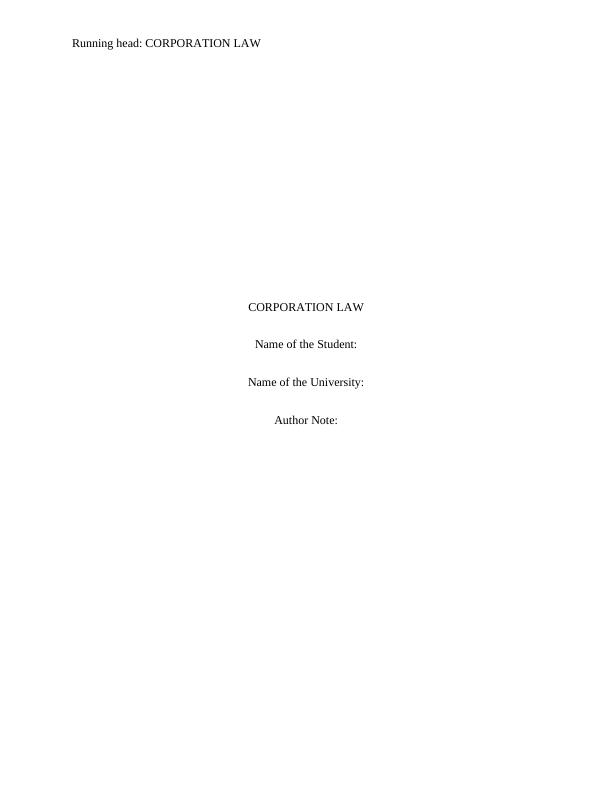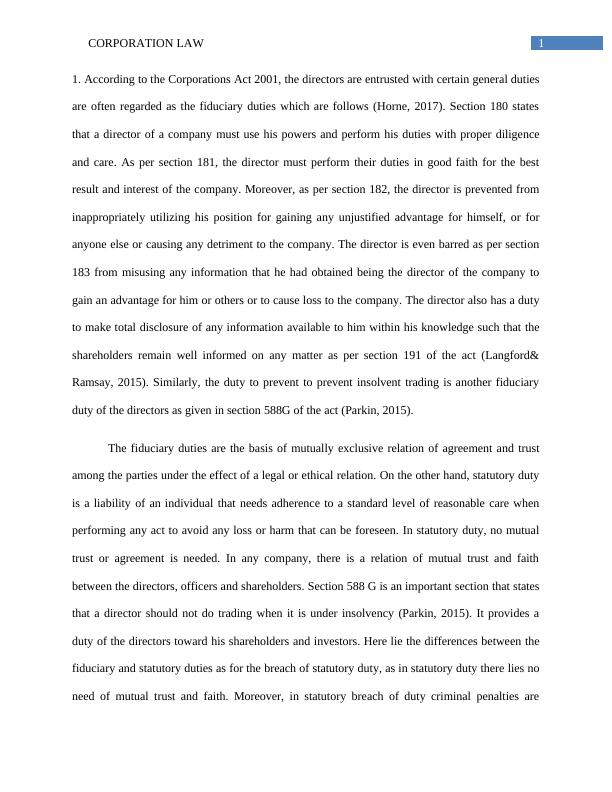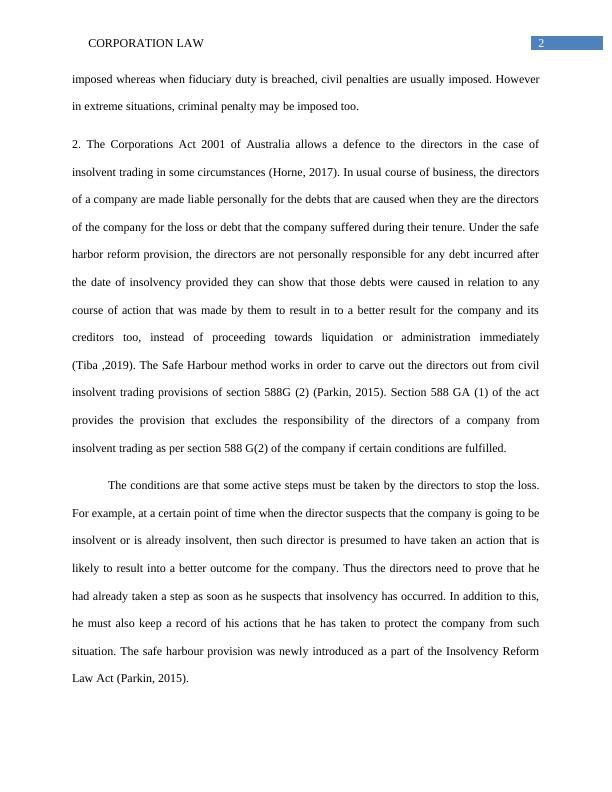Corporation Law: Duties and Liabilities of Directors
Added on 2023-01-16
10 Pages2960 Words88 Views
Running head: CORPORATION LAW
CORPORATION LAW
Name of the Student:
Name of the University:
Author Note:
CORPORATION LAW
Name of the Student:
Name of the University:
Author Note:

1CORPORATION LAW
1. According to the Corporations Act 2001, the directors are entrusted with certain general duties
are often regarded as the fiduciary duties which are follows (Horne, 2017). Section 180 states
that a director of a company must use his powers and perform his duties with proper diligence
and care. As per section 181, the director must perform their duties in good faith for the best
result and interest of the company. Moreover, as per section 182, the director is prevented from
inappropriately utilizing his position for gaining any unjustified advantage for himself, or for
anyone else or causing any detriment to the company. The director is even barred as per section
183 from misusing any information that he had obtained being the director of the company to
gain an advantage for him or others or to cause loss to the company. The director also has a duty
to make total disclosure of any information available to him within his knowledge such that the
shareholders remain well informed on any matter as per section 191 of the act (Langford&
Ramsay, 2015). Similarly, the duty to prevent to prevent insolvent trading is another fiduciary
duty of the directors as given in section 588G of the act (Parkin, 2015).
The fiduciary duties are the basis of mutually exclusive relation of agreement and trust
among the parties under the effect of a legal or ethical relation. On the other hand, statutory duty
is a liability of an individual that needs adherence to a standard level of reasonable care when
performing any act to avoid any loss or harm that can be foreseen. In statutory duty, no mutual
trust or agreement is needed. In any company, there is a relation of mutual trust and faith
between the directors, officers and shareholders. Section 588 G is an important section that states
that a director should not do trading when it is under insolvency (Parkin, 2015). It provides a
duty of the directors toward his shareholders and investors. Here lie the differences between the
fiduciary and statutory duties as for the breach of statutory duty, as in statutory duty there lies no
need of mutual trust and faith. Moreover, in statutory breach of duty criminal penalties are
1. According to the Corporations Act 2001, the directors are entrusted with certain general duties
are often regarded as the fiduciary duties which are follows (Horne, 2017). Section 180 states
that a director of a company must use his powers and perform his duties with proper diligence
and care. As per section 181, the director must perform their duties in good faith for the best
result and interest of the company. Moreover, as per section 182, the director is prevented from
inappropriately utilizing his position for gaining any unjustified advantage for himself, or for
anyone else or causing any detriment to the company. The director is even barred as per section
183 from misusing any information that he had obtained being the director of the company to
gain an advantage for him or others or to cause loss to the company. The director also has a duty
to make total disclosure of any information available to him within his knowledge such that the
shareholders remain well informed on any matter as per section 191 of the act (Langford&
Ramsay, 2015). Similarly, the duty to prevent to prevent insolvent trading is another fiduciary
duty of the directors as given in section 588G of the act (Parkin, 2015).
The fiduciary duties are the basis of mutually exclusive relation of agreement and trust
among the parties under the effect of a legal or ethical relation. On the other hand, statutory duty
is a liability of an individual that needs adherence to a standard level of reasonable care when
performing any act to avoid any loss or harm that can be foreseen. In statutory duty, no mutual
trust or agreement is needed. In any company, there is a relation of mutual trust and faith
between the directors, officers and shareholders. Section 588 G is an important section that states
that a director should not do trading when it is under insolvency (Parkin, 2015). It provides a
duty of the directors toward his shareholders and investors. Here lie the differences between the
fiduciary and statutory duties as for the breach of statutory duty, as in statutory duty there lies no
need of mutual trust and faith. Moreover, in statutory breach of duty criminal penalties are

2CORPORATION LAW
imposed whereas when fiduciary duty is breached, civil penalties are usually imposed. However
in extreme situations, criminal penalty may be imposed too.
2. The Corporations Act 2001 of Australia allows a defence to the directors in the case of
insolvent trading in some circumstances (Horne, 2017). In usual course of business, the directors
of a company are made liable personally for the debts that are caused when they are the directors
of the company for the loss or debt that the company suffered during their tenure. Under the safe
harbor reform provision, the directors are not personally responsible for any debt incurred after
the date of insolvency provided they can show that those debts were caused in relation to any
course of action that was made by them to result in to a better result for the company and its
creditors too, instead of proceeding towards liquidation or administration immediately
(Tiba ,2019). The Safe Harbour method works in order to carve out the directors out from civil
insolvent trading provisions of section 588G (2) (Parkin, 2015). Section 588 GA (1) of the act
provides the provision that excludes the responsibility of the directors of a company from
insolvent trading as per section 588 G(2) of the company if certain conditions are fulfilled.
The conditions are that some active steps must be taken by the directors to stop the loss.
For example, at a certain point of time when the director suspects that the company is going to be
insolvent or is already insolvent, then such director is presumed to have taken an action that is
likely to result into a better outcome for the company. Thus the directors need to prove that he
had already taken a step as soon as he suspects that insolvency has occurred. In addition to this,
he must also keep a record of his actions that he has taken to protect the company from such
situation. The safe harbour provision was newly introduced as a part of the Insolvency Reform
Law Act (Parkin, 2015).
imposed whereas when fiduciary duty is breached, civil penalties are usually imposed. However
in extreme situations, criminal penalty may be imposed too.
2. The Corporations Act 2001 of Australia allows a defence to the directors in the case of
insolvent trading in some circumstances (Horne, 2017). In usual course of business, the directors
of a company are made liable personally for the debts that are caused when they are the directors
of the company for the loss or debt that the company suffered during their tenure. Under the safe
harbor reform provision, the directors are not personally responsible for any debt incurred after
the date of insolvency provided they can show that those debts were caused in relation to any
course of action that was made by them to result in to a better result for the company and its
creditors too, instead of proceeding towards liquidation or administration immediately
(Tiba ,2019). The Safe Harbour method works in order to carve out the directors out from civil
insolvent trading provisions of section 588G (2) (Parkin, 2015). Section 588 GA (1) of the act
provides the provision that excludes the responsibility of the directors of a company from
insolvent trading as per section 588 G(2) of the company if certain conditions are fulfilled.
The conditions are that some active steps must be taken by the directors to stop the loss.
For example, at a certain point of time when the director suspects that the company is going to be
insolvent or is already insolvent, then such director is presumed to have taken an action that is
likely to result into a better outcome for the company. Thus the directors need to prove that he
had already taken a step as soon as he suspects that insolvency has occurred. In addition to this,
he must also keep a record of his actions that he has taken to protect the company from such
situation. The safe harbour provision was newly introduced as a part of the Insolvency Reform
Law Act (Parkin, 2015).

End of preview
Want to access all the pages? Upload your documents or become a member.
Related Documents
Corporation Law: Duties and Liabilities of Directorslg...
|11
|3079
|1
Corporation Law: Duties and Liabilities of Directorslg...
|11
|2976
|78
Understanding Business Law and Director's Dutieslg...
|11
|3023
|70
Business Lawlg...
|12
|2710
|219
Corporate Law: Duties and Liabilities of Directorslg...
|12
|2972
|313
Commercial and Corporations Law: Duties and Liabilities of Directorslg...
|11
|2930
|109
